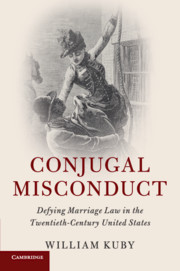
- Cited by 4
-
Cited byCrossref Citations
This Book has been cited by the following publications. This list is generated based on data provided by Crossref.
Steinfeld, Robert J. 2021. 'To Save the People from Themselves'.
Auspos, Patricia 2023. Breaking Conventions.
Epstein, Seth 2023. “Wanna get married?”: The taxi driver transportation network at the marriage mill of Elkton, Maryland, 1913–1941. The Journal of Transport History, Vol. 44, Issue. 3, p. 346.
Taskinen, Ilari 2024. Personal advertising and dating culture in World War II Finland. The History of the Family, Vol. 29, Issue. 4, p. 482.
- Publisher:
- Cambridge University Press
- Online publication date:
- February 2018
- Print publication year:
- 2018
- Online ISBN:
- 9781316673096
- Subjects:
- Legal History, US Law, Law, History, Twentieth Century American History


